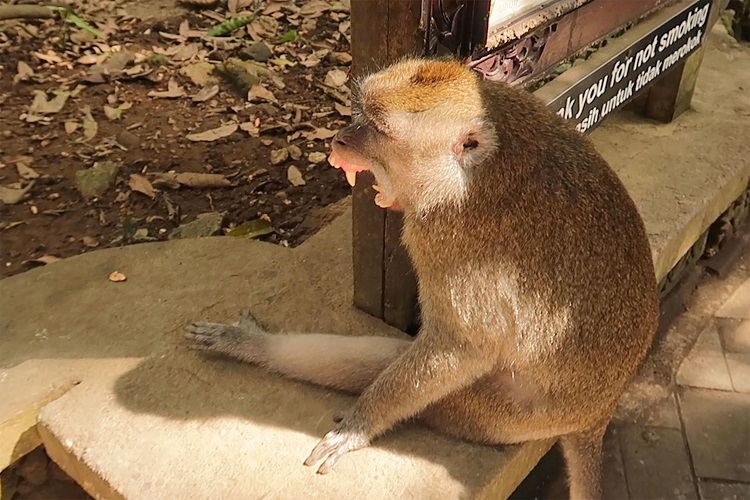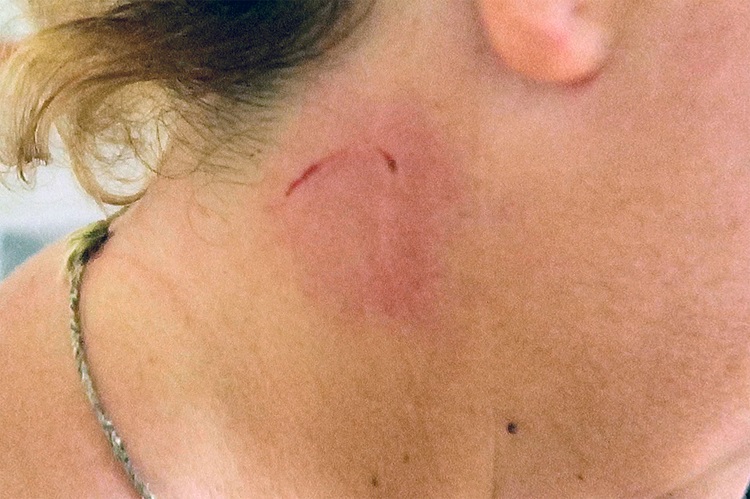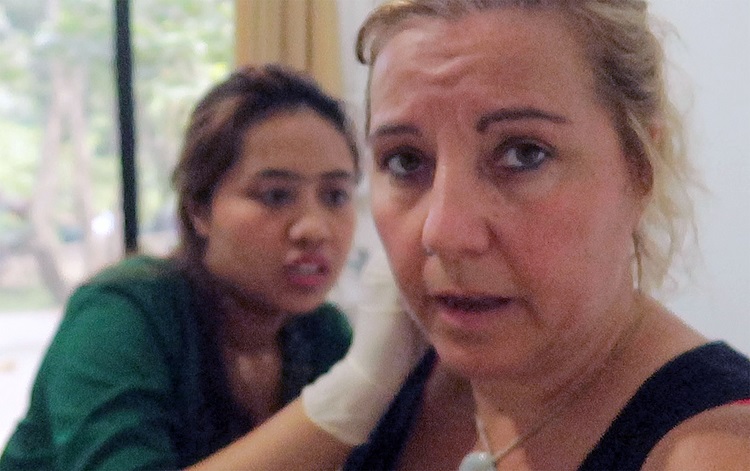Watch the video of the tourist below.
[rumble video_id=v5c0yz domain_id=u7nb2 iframe]
What was supposed to be a relaxing holiday for an Australian tourist in Bali turned into a trauma-filled one after a monkey attacked her and bit her neck. It was Patrizia Accoglienza’s first time to visit the Indonesian tourist island so she decided to see all the sights which included the Ubud Sacred Monkey Forest Sanctuary which is quite popular.
Patrizia visited the park on June 19, 2019 and after paying the$5.60 [$8AUD] entrance fee, proceeded to walk the park’s grounds. But her visit was cut short after a large monkey allegedly pounced on her backpack then bit her on the neck from behind.
She pushed the large primate off her and could only watch in terror as the monkey perched onto a ledge nearby and ‘aggressively’ bared his teeth at her.
The 42-year-old photographer from Melbourne, Victoria, Australia, then proceeded to the park’s clinic upon which the attending nurse showed her a certificate certifying that the monkeys were free from rabies or other diseases.
But Patrizia decided not to take any chances and got all the necessary injections which set her back by a whopping $5,600[$8,000AUD].
She said: “I’d never been to Bali before and heard about the monkey forest, so decided to give it a chance.
“I was there for about an hour before I got bitten. I was photographing a monkey that was about two meters away from me at the time.
“Suddenly, another big monkey jumped on my backpack and bit my neck from behind. It happened so quickly, I was in total shock, and just pushed him off straight away.
“He jumped to a nearby ledge and showed his teeth in an aggressive manner. I asked another tourist nearby what my neck looked like and he told me there was blood.
“I was in a panic. I was advised by a staff member to go to the first aid clinic, who cleaned the wound with antiseptic. She told me there were two teeth piercings, which confirmed I’d been bitten.
“I asked about a rabies injection, but she showed me a certificate which said the monkeys are tested and don’t have any diseases, including rabies. She said I didn’t need to worry and sent me on my way.
“But I realized it was better to be safe than sorry. I went to a nearby health care clinic, who told me that I had the most serious form of rabies exposure because the bite was on my neck and close to a lot of nerves.
“My entire treatment plan was going to cost me over $5,600[$8,000AUD]. But I just paid it because nothing is more important than your health.”
Aside from the injections, Patrizia also had to take two weeks worth of hepatitis tablets although the health care clinic she went to had provided them for free.
Fortunately, Patrizia had signed up for travel insurance in Australia before her trip so her medical costs will be reimbursed by the insurance company.
She said: “The entire ordeal left me in shock, and I certainly wouldn’t be visiting any more monkey reserves.
“I’d also witnessed a few other people coming into the first aid room at the monkey forest who has been either scratched or bitten by them.
“It was a huge amount to pay upfront, and I’m just thankful that I had that in my bank account. Luckily, I’d taken out travel insurance who will be able to reimburse me.
“But my $5.60 admission fee to the monkey forest certainly gained a few zeros.”
Meanwhile, an Ubud Sacred Monkey Forest Sanctuary spokesperson said: “One of the top concerns we receive from visitors is about rabies.
“We always do a rabies test when we found one of our monkeys suddenly dead without any clear reason.
“We will bring the body of the monkey to Bali Animal Disease Investigation Center for the rabies test, and they will take the brain tissue as a sample for rabies testing.
“The tests conducted in 2013, 2014 and 2015 were negative for rabies.
“We do not have any date for 2016 until today because no monkeys have died without reason.
“The visitor might get bitten by the monkeys because they have interaction, bring food, drinks, plastic or paper bag.
“The monkeys are not aggressive by nature. They will only defend themselves if they feel threatened.
“They are wild animals and not pets, so they might have an unpredictable reaction.
“We do provide guidelines that should be followed by visitors during their visit.”





